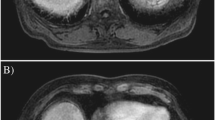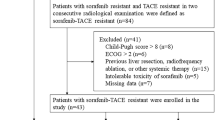Abstract
Few reports have described dose re-escalation after long-term low-dose sorafenib leading to good outcomes. Here, we report the case of an 80-year-old woman with advanced hepatocellular carcinoma who achieved complete response from sorafenib dose re-escalation after the failure of long-term low-dose sorafenib treatment combined with transcatheter arterial chemoembolization. Sorafenib therapy was initiated at 400 mg once daily due to old age and low platelet count. 5 months later, this dose was reduced to 200 mg once daily because of adverse events. Best radiological antitumor response by sorafenib treatment alone was judged as stable disease according to the modified Response Evaluation Criteria in Solid Tumors. 1 year later, she showed progressive disease owing to the progression of intrahepatic lesions. She received combination therapy with low-dose sorafenib (200 mg every other day) and transcatheter arterial chemoembolization, which proved relatively effective for three and a half years. Antitumor response by the fourth transcatheter arterial chemoembolization and subsequent low-dose sorafenib was clearly progressive disease. At that time, sorafenib-related adverse events were well-controlled. Sorafenib dose was re-escalated to 200 mg once daily. After this re-escalation, tumor markers declined rapidly, and adverse events remained tolerable. 4 months later, complete response was achieved.



Similar content being viewed by others
References
Llovet JM, Ricci S, Mazzaferro V, et al. Sorafenib in advanced hepatocellular carcinoma. N Engl J Med. 2008;359:378–90.
Cheng A-L, Kang Y-K, Chen Z, et al. Efficacy and safety of sorafenib in patients in the Asia-Pacific region with advanced hepatocellular carcinoma: a phase III randomised, double-blind, placebo-controlled trial. Lancet Oncol. 2009;10:25–34.
Kuzuya T, Ishigami M, Ishizu Y, et al. Fever within 2 weeks of sorafenib therapy predicts favorable treatment efficacy in patients with advanced hepatocellular carcinoma. Oncology. 2016;91:261–6.
Ogasawara S, Chiba T, Ooka Y, et al. Is intra-patient sorafenib dose re-escalation safe and tolerable in patients with advanced hepatocellular carcinoma? Int J Clin Oncol. 2014;19:1029–36.
Hiraoka A, Michitaka K, Kumada T, et al. Validation and potential of albumin-bilirubin grade and prognostication in a nationwide survey of 46,681 hepatocellular carcinoma patients in Japan: the need for a more detailed evaluation of hepatic function. Liver Cancer. 2017;6:325–36.
Imai K, Takai K, Miwa T, et al. Rapid depletions of subcutaneous fat mass and skeletal muscle mass predict worse survival in patients with hepatocellular carcinoma treated with sorafenib. Cancers (Basel). 2019;11:1206.
Boudou-Rouquette P, Ropert S, Mir O, et al. Variability of sorafenib toxicity and exposure over time: a pharmacokinetic/pharmacodynamic analysis. Oncologist. 2012;17:1204–12.
Arrondeau J, Mir O, Boudou-Rouquette P, et al. Sorafenib exposure decreases over time in patients with hepatocellular carcinoma. Invest New Drugs. 2012;30:2046–9.
Nozawa M, Yamamoto Y, Minami T, et al. Sorafenib rechallenge in patients with metastatic renal cell carcinoma. BJU Int. 2012;110:E228–E23434.
Zama IN, Hutson TE, Elson P, et al. Sunitinib rechallenge in metastatic renal cell carcinoma patients. Cancer. 2010;116:5400–6.
Grünwald V, Weikert S, Seidel C, et al. Efficacy of sunitinib re-exposure after failure of an mTOR inhibitor in patients with metastatic RCC. Onkologie. 2011;34:310–4.
Kuczynski EA, Sargent DJ, Grothey A, et al. Drug rechallenge and treatment beyond progression-implications for drug resistance. Nat Rev Clin Oncol. 2013;10:571–87.
Tang TC, Man S, Xu P, et al. Development of a resistance-like phenotype to sorafenib by human hepatocellular carcinoma cells is reversible and can be delayed by metronomic UFT chemotherapy. Neoplasia. 2010;12:928–40.
Okuwaki Y, Nakazawa T, Hidaka H, et al. Late-onset benefit in progressive advanced hepatocellular carcinoma with continued sorafenib therapy: a case report. J Med Case Rep. 2012;6:38.
Bruix J, Qin S, Merle P, et al. Regorafenib for patients with hepatocellular carcinoma who progressed on sorafenib treatment (RESORCE): a randomised, double-blind, placebo-controlled, phase 3 trial. Lancet. 2017;389:56–66.
Kuzuya T, Ishigami M, Ito T, et al. Clinical characteristics and outcomes of candidates for second-line therapy, including regorafenib and ramucirumab, for advanced hepatocellular carcinoma after sorafenib treatment. Hepatol Res. 2019;49:1054–65.
Zhu AX, Kang Y-K, Yen C-J, et al. REACH-2: a randomized, double-blind, placebo-controlled phase 3 study of ramucirumab versus placebo as second-line treatment in patients with advanced hepatocellular carcinoma (HCC) and elevated baseline alpha-fetoprotein (AFP) following first-line sorafenib. J Clin Oncol. 2018;36:4003–4003.
Author information
Authors and Affiliations
Corresponding author
Ethics declarations
Conflict of interest
Hisanori Muto, Teiji Kuzuya, Takanori Ito, Yoji Ishizu, Takashi Honda, Tetsuya Ishikawa, Masatoshi Ishigami and Mitsuhiro Fujishiro declare that thay have no conflict of interest.
Human rights
All procedures followed have been performed in accordance with the ethical standards laid down in the 1964 Declaration of Helsinki and its later amendments.
Informed consent
Informed consent was obtained from all patients for being included in the study.
Additional information
Publisher's Note
Springer Nature remains neutral with regard to jurisdictional claims in published maps and institutional affiliations.
Rights and permissions
About this article
Cite this article
Muto, H., Kuzuya, T., Ito, T. et al. Complete response of advanced hepatocellular carcinoma achieved by sorafenib dose re-escalation after failure of long-term low-dose-sorafenib treatment combined with transcatheter arterial chemoembolization: a case report. Clin J Gastroenterol 13, 397–402 (2020). https://doi.org/10.1007/s12328-019-01066-7
Received:
Accepted:
Published:
Issue Date:
DOI: https://doi.org/10.1007/s12328-019-01066-7




